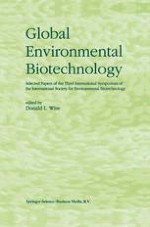1997 | OriginalPaper | Buchkapitel
Stress responses of three Pseudomonas species and Stenotrophomonas maltophilia to heat and selected pollutants
verfasst von : Oleg Yuriev, Buem-Seek Park, Nina Simonov, Paul Chambers, Margaret L. Britz
Erschienen in: Global Environmental Biotechnology
Verlag: Springer Netherlands
Enthalten in: Professional Book Archive
Aktivieren Sie unsere intelligente Suche, um passende Fachinhalte oder Patente zu finden.
Wählen Sie Textabschnitte aus um mit Künstlicher Intelligenz passenden Patente zu finden. powered by
Markieren Sie Textabschnitte, um KI-gestützt weitere passende Inhalte zu finden. powered by
Microbial species respond to changes in their environmental conditions by producing a range of new proteins which assist their survival and adaptation to new conditions. Normally, sudden changes in temperature (heat shock), exposure to potentially toxic substances (ethanol, hydrogen peroxide, heavy metal ions) or the onset of starvation cause the production of stress-related proteins. The most thoroughly studied stress proteins include the heat shock proteins (HSP), where the mostly highly conserved responses across genera and shock conditions is the production of the HSP60 (GroEL) and HSP70 (DnaK) group of proteins [1]. The major HSPs synthesised by Escherichia coli (HtpG, GroEL and DnaK) were designated as molecular chaperones because of their role in protein folding for both newly synthesised proteins and proteins partially denatured by stressing conditions [1], where elevated activity of these proteins is essential for cell recovery [2]. Although the heat-shock response of E. coli occurs even for mild, non-lethal temperature upshifts, the intensity of the response depends on the severity of the temperature shift: a 2-fold increase in GroEL and DnaK may occur with a shift from 30°C to 42°C, whereas a 10-fold increase is caused by a shift to 46°C [3]. Other environmental hazards also cause similar stress responses in cells, including cold shock [4], nutrient starvation [5] and exposure to pollutants such as heavy metal ions and organic compounds [6–8]. Blom et al. [6] reported that E. coli synthesises up to 39 new proteins after exposure to a range of different pollutants, where there was some commonality in the types of proteins produced in response to the different chemicals.
